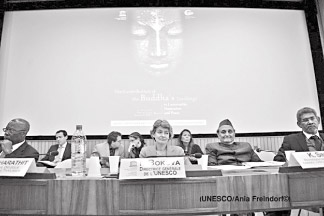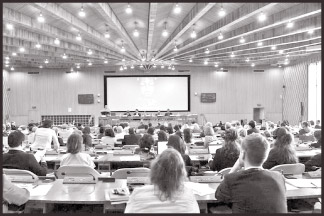Humanism, the heart of Buddha’s message - UNESCO Chief
|

Seen are from left: President UNESCO General Conference Dr.
Davidson Hepburn, UNESCO Director General Irina Bokova, Member
of Parliament and Representative of India on the UNESCO
Executive Board Dr. Karan Singh and Ambassador of Sri Lanka to
France and Permanent Delegate of Sri Lanka to UNESCO Dr. Dayan
Jayatilleka at the Symposium. |
The teachings of the Buddha as a man, a thinker, and a philosopher,
are a source of light. They are a source of nourishment for the mind and
of serenity for the heart, said UNESCO Chief Irina Bokova at a symposium
on ‘The Contribution of the Buddha’s Teachings to Universality, Humanism
and Peace’ to mark the 2600th Anniversary of the Buddha’s Enlightenment.
The symposium was held in Paris on Friday.
“The teachings of the Buddha on universality, humanism and peace are
part of this vision of a more just, more humane, more peaceful life for
every man and woman,” Bokova said.
The UNESCO Chief said: “We are living in times of uncertainty - when
individuals are buffeted by change, when societies are tested by natural
disasters, by deep disparities and enduring conflict.
“I believe that the world is not peaceful nor is it safe when over
one billion people live in extreme poverty.
Societies are not secure when people lack access to education and
health, when human behaviour threatens the environment, when women do
not enjoy equal rights.
I believe that our future is not assured when over eight million
children die each year before the age of five.
And all of this is within the context for the appeal I have made for
a new humanism as the basis for human relations and human development in
the 21st century.
In such times, I am convinced the inherent dignity and human rights
of every individual must be the starting point for all our action and
the measure of its success.
For me, a new humanism means ensuring that every boy and girl goes to
school and receives a quality education.
It means reaching gender equality, giving women and men equal access
to knowledge and power.
It also means a better grasp of our environment, by understanding and
anticipating the consequences of climate change and how this affects the
lives of millions of people.
It means protecting humanity’s great cultural diversity, along with
the world’s biodiversity.
I believe the foundations of genuine peace lie with each individual’s
ability to imagine a better world and to shape reality in this
direction. What we are seeing now in the world - the quest for freedom -
is also part of this.
I use the term ‘new humanism’, but I know these ideas are not new.
They reflect age-old wisdom.
Old wisdom
|

Participants at the symposium |
Much of this wisdom is, indeed, 2,600 years old.
UNESCO is built on the pillars of universality, humanism and peace.
Along the lines of the Buddha’s teachings: “Since wars begin in the
minds of men; it is in the minds of men that the defences of peace must
be constructed”.
This philosophy and these words open our Constitution.
They inspire our work to promote international cooperation in
education, culture, the sciences and communication as the way to empower
individuals, on the basis of the democratic principles of dignity,
equality and mutual respect.
Humanism lies at the heart of the Buddha’s teachings.
Buddhism teaches us that “we are our master”.
Each of us contains the keys to our own enlightenment.
In this sense, the human being lies at the core of its own existence.
This implies both responsibility and freedom - to take care of one’s
thought and action, to make the most of the freedom we have to decide
and to choose our fate.
For the Buddha, this called for critical thinking. This is the
capacity to question, to examine, to weigh, to examine conventional
wisdom and to explore new ideas.
At the heart of this humanism lies a deep thirst for knowledge, so
richly reflected in the Tripitaka, the collection of Buddha’s teachings.
And this leads me to the concept of universality.
The Buddha taught that the true strength of the individual -
regardless of origin, condition or faith - lies in the mind.
This potential is endless. This open inner horizon holds the keys to
universality.
Education, training
The thoughts and the spirit of every individual may be guided to
attain this universality, free of hatred and excessive desire, through
education, training, meditation and moral discipline.
The teachings of the Buddha carry a powerful message of solidarity
that resides in the capacity of every individual to understand the
other, to know the other.
As Buddha said, “in the sky, there is no distinction of east and
west; people create distinctions out of their own minds and then believe
them to be true.”
Every individual is different, no culture is the same - but we are
all joined by the essence of humanity, by the values of dignity, respect
and compassion that are universal.
These lie at the heart of the Buddha’s teachings, and they are also
part of UNESCO’s mission.
Here lies also the bridge between cultural diversity and
universality, between the differences that enrich our world and the
common humanity we all share.
“Peace comes from within,” the Buddha had said. “Do not seek it
without.”
Genuine peace stems from inner peace, from the fulfilment of our
potential, from the realisation of our freedom.
This requires dedication. It does not simply happen.
A culture of peace can arise only from knowledge and understanding.
These are the foundations for respect and cooperation.
Education lies at the heart of this.
“It is better to conquer yourself than to win a thousand battles,”
said the Buddha.
This is genuine wisdom.
The teachings of the Buddha invite us to think deeply about the world
we live in, about our societies, and especially about ourselves.
These teachings are an invitation also to exchange with others and
other religions other cultures guided by openness and respect”.
Secretary General’s message
Acknowledging the importance of holding a scholarly Symposium on ‘The
Contribution of the Buddha’s Teachings to Universality, Humanism and
Peace’, United Nations’ Secretary-General Ban Ki-moon noted that the
Buddha’s observations of 2,600 years ago still apply today and that “His
timeless teachings can help us as we seek to overcome the many problems
facing the world today”.
In a message to the Symposium, the UN Secretary-General said: “I am
pleased to send greetings to this gathering of scholars, diplomats and
other eminent persons commemorating the 2,600th anniversary of the
Enlightenment of the Buddha.
It is fitting that this meeting is being hosted by the United Nations
Educational, Scientific and Cultural Organization. For decades, UNESCO
has been supporting thoughtful scholarship about Buddhism and the
world’s other major religions. UNESCO has inscribed a number of
important Buddhist sites on its World Heritage List. And UNESCO has
actively worked to conserve these sites, including the birthplace of the
Buddha in Lumbini, Nepal.
Three years ago, I went to Lumbini to pay my respects. Walking
through the sacred grounds, I contemplated the extraordinary life of
young Siddhartha.
His timeless teachings can help us as we seek to overcome the many
problems facing the world today.
The Buddhist values of compassion and peace are relevant to our
efforts to overcome intolerance, poverty and war.
His observations of 2,600 years ago still apply today: that all
people are inter-linked, that life and the environment are one, and that
we must show profound respect of all living beings.
Buddhism’s emphasis on mindfulness reminds me of the UNESCO
Constitution, which opens with the famous words: “since wars begin in
the minds of men, it is in the minds of men that the defences of peace
must be constructed”.
In that spirit, the United Nations is building strong defences of
peace through mediation, dialogue and diplomacy. We are striving to
remove the conditions that cause unrest, from hunger and poverty to
inequality and in justice.
And we are unwavering in our commitment to protect our planet’s
environment.
As we celebrate the Enlightenment of the Buddha, let us remember,
above all, His message of tolerance. Let us respect all religions. And
let us work for the well-being of people”. |

